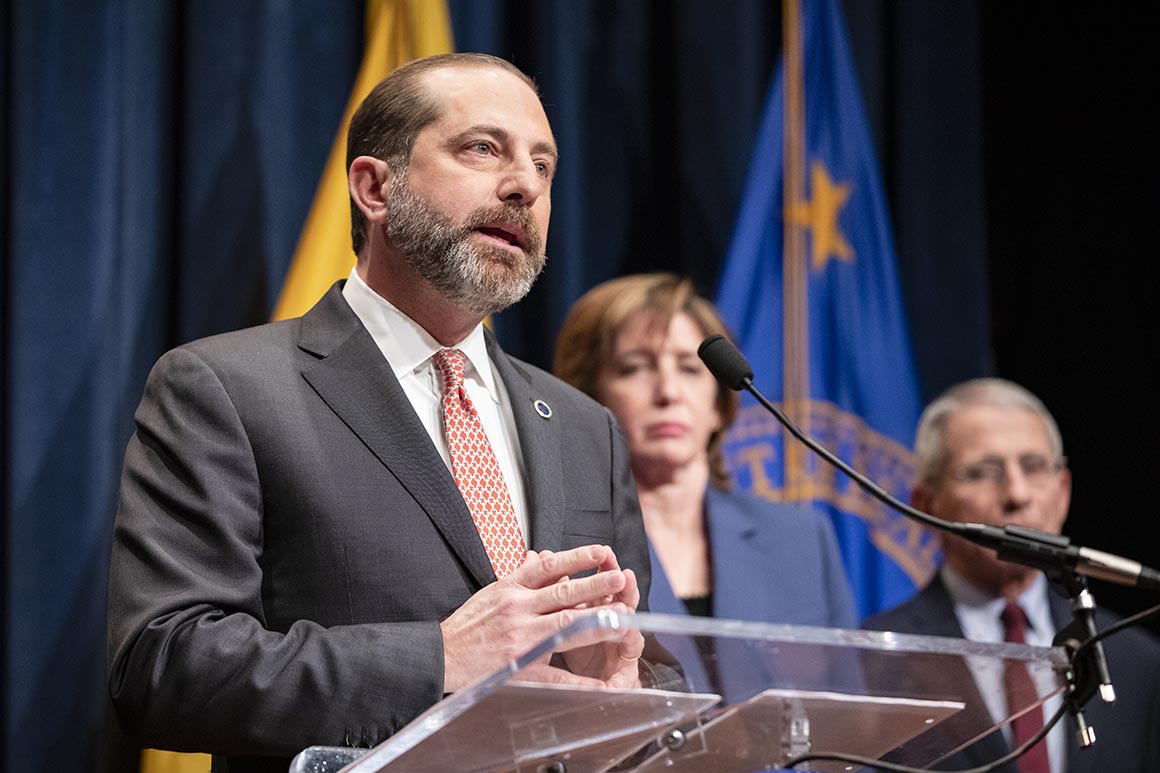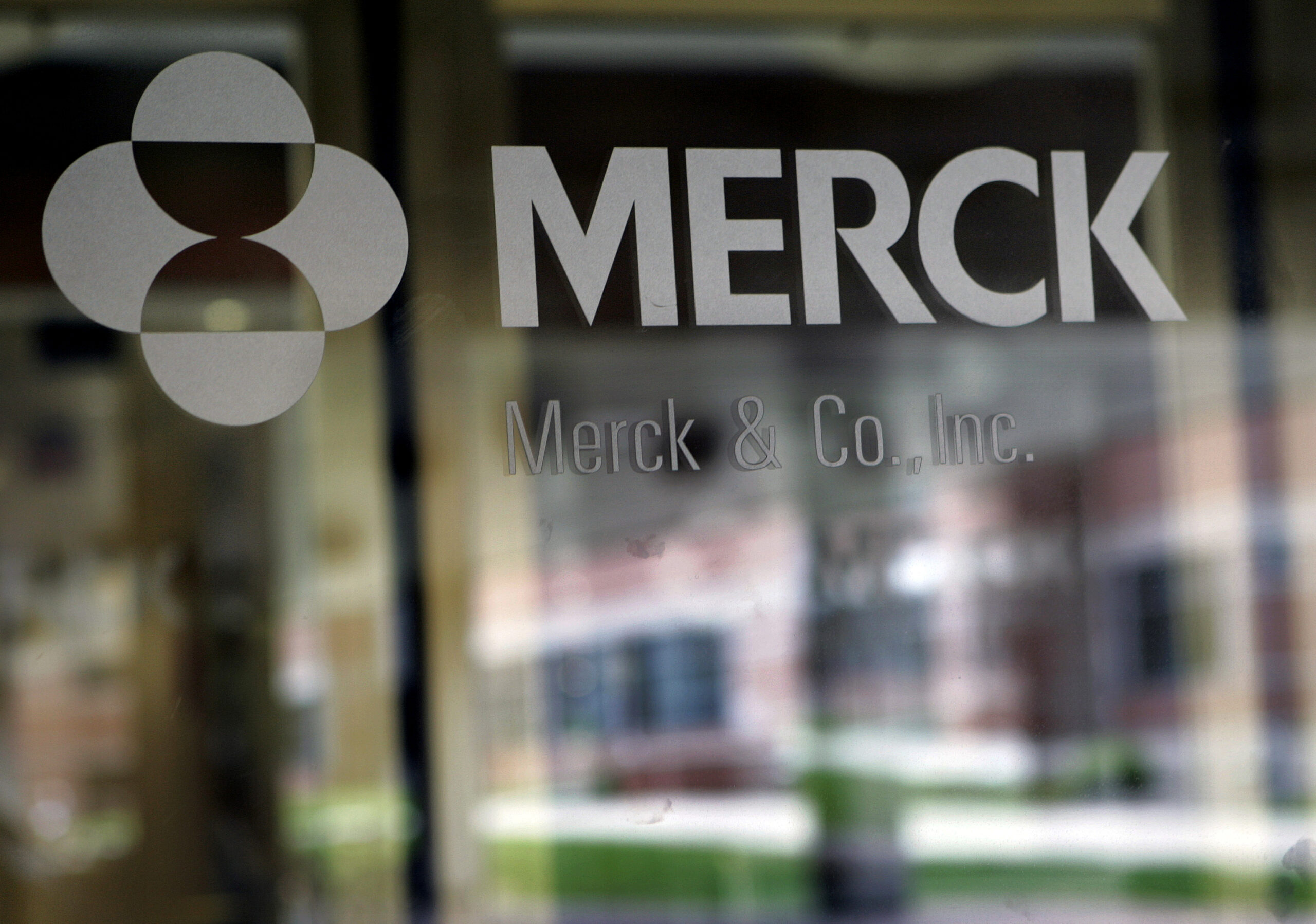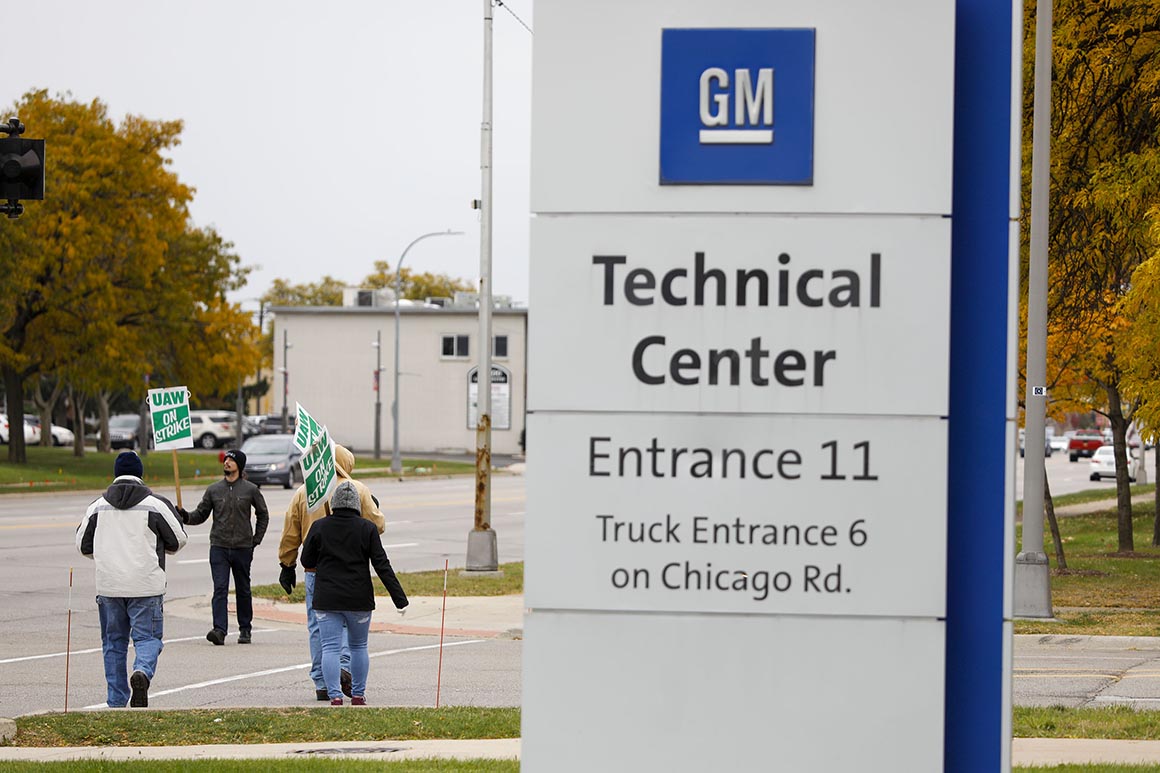Healthcare
Trump sticks embattled health chief with coronavirus response

The White House stressed that Azar would not have been elevated to lead the administration’s response to the coronavirus if the president and top aides did not trust him.
“The president has complete confidence in Secretary Azar which is exactly why he was chosen to lead the President’s Coronavirus Task Force and anyone spreading rumors to the contrary is simply uninformed and misguided,” Mulvaney told POLITICO in a statement.
“Secretary Azar is leading the efforts of the United States’ response to the novel coronavirus, and is the strongest and most competent health secretary I have ever observed,” Robert Redfield, the nation’s CDC director, said in a statement.
The health department also dismissed criticism of Azar’s efforts to fight the outbreak, with HHS spokesperson Caitlin Oakley calling assertions of a slow response “the exact opposite of the truth.”
“Secretary Azar has had daily briefings and interactions with the President on Novel Coronavirus,” she said in a statement. “Secretary Azar has directed the Department to transparently communicate updates on the Novel Coronavirus to the American people through every medium available, often many times a day as details develop.”
Trump has been largely restrained in his public comments on the current outbreak — a departure from his repeated, often alarmist tweets during the 2014 Ebola outbreak. Against the advice of public-health leaders, Trump at the time even urged the United States to close its borders to flights from West Africa — which would have locked out two U.S. health workers who’d become ill in Liberia and had to be airlifted to Atlanta for treatment.
“Stop the EBOLA patients from entering the U.S. Treat them, at the highest level, over there. THE UNITED STATES HAS ENOUGH PROBLEMS!” Trump tweeted in August 2014.
By contrast, Trump this week at times appeared to sound unconcerned in the face of escalating risks. On Thursday at a speech at Michigan manufacturing plant, he downplayed any danger and told attendees that the spread of the coronavirus would have “a very good ending for us.” He added the administration was working “closely” with China to fight the virus and said hopefully “it won’t be as bad as some people think it could be.”
In reality, Trump behind the scenes has repeatedly quizzed aides about the coronavirus and its risks to Americans. Officials say Trump wants to project the image of the White House on the offensive toward the coronavirus, which the World Health Organization on Thursday declared a global public health emergency.
Appearing highly responsive on health care is a major White House priority after the president expressed irritation with his own administration’s moves on vaping and drug pricing, in addition to frustration about Republicans’ inability to repeal Obamacare. Health care has generally been a political loser for this administration. Trump’s own recent, internal polling shows it as a weak spot for him, and a strength for Democrats, heading into the 2020 campaign. Trump berated Azar for the bad polling in mid-January, breaking away from a political strategy meeting in order to vent to his health secretary by phone.
White House officials are now holding at least one daily meeting on the coronavirus and convening multiple calls. Trump tweeted photos on Wednesday of one high-powered session in the White House Situation Room, where the president was surrounded by top aides like Mulvaney and Dan Scavino alongside Azar, Redfield and Fauci.
“Just received a briefing on the Coronavirus in China from all of our GREAT agencies, who are also working closely with China. We will continue to monitor the ongoing developments. We have the best experts anywhere in the world, and they are on top of it 24/7!” Trump tweeted on Wednesday night.
With the coronavirus, the White House must fend off a high-pressure and surging global health crisis that has administration officials privately on edge. The crisis also will test Azar’s ability to lead the response effort in a White House where he has few allies and many enemies — including supporters of Seema Verma, another top health official who spent much of 2019 at war with Azar over policy and personnel.
“Key experts who would help lead a response from the National Security Council are gone or divested and the functions collapsed, and so you’re dependent on coordination from a reluctant health secretary,” said one former administration official.
Azar’s own allies argue that he’s adopted a thorough response to the spreading crisis that’s grounded in public-health best practices. Inside the health department, senior health officials like Redfield and Fauci have been empowered to move quickly on preparing for U.S. outbreaks and devising potential treatments. Azar also tapped his department’s emergency-response team to coordinate efforts, a strategy that helped the Trump administration respond to other crises like earthquakes, hurricanes and the rapid effort to reunify migrant families that the administration separated at the border.
The health secretary’s moves have received some bipartisan applause. Ron Klain, who helped lead President Barack Obama’s response to the 2014-2015 Ebola outbreak, has repeatedly praised Azar for taking “wise steps” even as he bashed the president himself for dismantling public-health functions.
In public and in private, Azar has touted his experience fighting an earlier coronavirus outbreak called SARS and other crises as a senior health official during the George W. Bush administration. “He knows the questions to ask,” like whether officials have fully gamed out potential scenarios, said a senior health official who’s been in strategy meetings with Azar this week.
Two Azar allies also argue the secretary’s department has been transparent amid the health crisis, such as providing the White House’s Domestic Policy Council — which traditionally hasn’t played a role in health outbreaks — with additional briefings earlier this month upon request. Meanwhile, Azar has been demanding greater transparency from China, as health officials seek more data about the mystery virus and offer to send international aid workers to help fight the outbreak.
“Alex has pushed to see if we can send some of our people there to not only help the Chinese but also get some information that would inform our strategies and response,” said Fauci, the infectious disease doctor.
Meanwhile, Azar opted out of a sought-after trip to Iowa next week where the health secretary was scheduled to join other Cabinet members as one of the president’s surrogates during the Iowa caucuses. “Azar was invited and is no longer going,” said a person familiar with the secretary’s plans. “He’s staying in Washington to lead the charge and response on coronavirus.”
But Azar’s position in the administration remains weakened after his extensive battles with Verma, the nation’s Medicaid and Medicare chief who was previously a consultant for then-Indiana Gov. Mike Pence. Azar and Verma’s battles grew so severe last month that the White House prepared a shortlist of replacements for both officials. Neither Azar nor Verma’s jobs are currently at risk, officials maintain, noting that Verma on Thursday morning rolled out a plan to overhaul the nation’s Medicaid program, with White House support.
Fauci, who’s worked in the health department since 1968 and led the nation’s infectious-disease response since 1984, argued that Azar is striking the right balance of communicating big decisions while trusting the health department’s army of career scientists. “Good secretaries have transcended administrations,” Fauci said. “Alex is clearly right up there.”
Healthcare
Merck sues HHS over drug negotiation, claims program ‘tantamount to extortion’

[ad_1]
The New Jersey-based company is asking the U.S. District Court for the District of Columbia for an injunction to stop the rules from going into effect over the next several months.
“Because this statute unlawfully impairs our core purpose of engaging in innovative research that saves and improves lives, Merck intends to litigate this matter all the way to the U.S. Supreme Court if necessary,” Robert Josephson, a Merck spokesperson, said in a statement.
The White House, HHS and CMS did not immediately respond to a request for comment on the lawsuit.
At issue are the requirements surrounding the Inflation Reduction Act’s negotiation process, in which CMS will negotiate what Medicare pays for 10 widely used, high-priced drugs with no generic competition.
Merck, in its complaint, said the negotiations and the stipulated minimum discounts drugmakers are forced to provide lest they incur a massive tax, run afoul of the Fifth Amendment’s takings clause, which requires the government provide “just compensation” for property taken for public use.
“The IRA wields the threat of crippling penalties to force manufacturers to transfer their patented pharmaceutical products to Medicare beneficiaries, for public use. And the [Inflation Reduction] Act costumes these seizures as ‘sales’ by forcing manufacturers to accept Government-dictated payments that represent a fraction of the drugs’ fair value. By definition — and by design — that is not ‘just compensation,’” the company claimed in its suit.
Merck also argued that, by participating in what it calls “sham negotiations and agreements,” its freedom of speech is being stifled.
“Conscripting companies to legitimize government extortion is the sort of parroted orthodoxy that the First Amendment’s compelled-speech doctrine forbids,” the suit said.
Further, the company told the court that the government is stopping Merck from engaging in “counterspeech” about the negotiations following guidance CMS issued in March that prohibits companies from publicly disclosing “any information exchanged verbally during the negotiation period.”
“The IRA uses severe penalties to requisition medicines while refusing to pay their fair value — and then coerces manufacturers to smile, play along, and pretend it is all part of a ‘fair’ and voluntary exchange,” the suit alleges.
The timing is important: CMS is slated to release a list of the first 10 drugs for negotiation on Sept. 1 — less than three months away. Merck’s widely prescribed blood sugar medicine Januvia is likely to be among the medicines chosen. The company said it expects its cancer drug Keytruda and Janumet, a diabetes treatment, will be selected in future rounds.
[ad_2]
Source link
Healthcare
Auto industry could shift to make ventilators

The U.S. faces a shortage of life-saving ventilators if patients infected with Covid-19, a respiratory disease caused by the coronavirus, overwhelm U.S. hospitals.
President Donald Trump on Wednesday invoked the Defense Production Act, which will allow him to direct domestic manufacturers to produce medical supplies and other necessary items during the crisis.
White House economic adviser Larry Kudlow said Wednesday that he was in touch with leaders of two of the three major U.S. automakers. Ford and Fiat Chrysler also said they would suspend production of automobiles until at least March 30.
“One of them told me that even though the men and women may be off for two weeks due to the virus, she’s going to try to call them back so they can produce ventilators,” Kudlow said on Fox News, in an apparent reference to Barra, the only female CEO of a major U.S. auto company.
“They might even ask them to do it on a voluntary basis for civic and patriotic reasons,” he said.
The auto industry in Canada has also expressed a willingness to produce necessary medical supplies for demand in that country.
“We’ve got the capacity to make things from simple one-shot molds to complex assemblies. We make 500,000 of something every year, a thousand a day,” said Flavio Volpe, president of Canada’s Automotive Parts Manufacturers’ Association.
“The country needs masks, gowns, goggles, ventilators. Can we assign some of our capacity to be able to help the cause,” he said in an interview with CBC. “The response has been overwhelming from auto parts makers. We’re in, just get us the specs.”
Healthcare
Hospitals bid for $100 billion in next coronavirus package

As prominent employers in many congressional districts, hospitals are used to being heard, and lawmakers are signaling that they’re ready to step in. Senate Minority Leader Chuck Schumer, who is closely aligned with New York’s hospital lobbies, vowed he’d fight for a “Marshall Plan for hospitals”
Schumer’s calling for $400 billion to purchase equipment and deal with the expected swell in patients. The money would also address cash-flow issues for facilities that will take a major financial hit postponing lucrative elective procedures like joint replacements.
The hospitals’ lobbying push rapidly intensified this week as government officials presented sobering forecasts of staggering caseloads and reports out of virus-ravaged Italy showed overwhelmed hospitals rationing care — a harbinger of what could happen to the more unwieldy, patchwork U.S. system.
Millions of Americans remain uninsured and some of the most impoverished states don’t have coverage for some low-income residents because they haven’t expanded Medicaid. But even in states that did, projections show the health system could be overwhelmed in a matter of weeks. Colorado, Kentucky, Massachusetts and Ohio have suspended elective surgeries to try and keep beds open.
The cancellation of these procedures began, for some, even before Surgeon General Jerome Adams urged them to do so over the weekend. Many patients simply heeded public officials’ advice to stay home.
Now, many hospitals are in limbo, waiting for a potential surge of Covid-19 patients. What this means for their financial situation varies. Small, rural hospitals, in particular, were already close to going broke before the virus hit, but they’re also used to operating on small margins. After years of consolidation, some big health systems in urban areas have built up huge overhead as their hospitals and specialty centers see a massive drop-off in referrals and appointments for pricey procedures.
Meanwhile, hospitals in some hard-hit areas are grappling with more infected patients, coupled with a lack of personalized equipment to keep frontline nurses, doctors and other staff safe.
“We’ve had a dramatic shift in our area in the last three to four days,” Cassie Sauer, president and CEO of the Washington State Hospital Association, said earlier this week. “The number of patients has grown exponentially.”
Those hospitals that haven’t seen cases yet are ramping up for the pandemic.
The waiting game raises questions about how long some hospitals can they keep paying their staff while turning away paying business at an ever-accelerating pace.
Jose Sanchez, CEO of the Chicago safety net Norwegian American Hospital, said he’s got enough cash to make the next two payrolls. For now, he’s trying to make sure all expected billings come in on time — especially from private Medicaid plans where he’s seen a delay as insurers have their staff working from home.
“If you were in a different business, you’d be laying people off, but that’s just the opposite of the situation we’re in,” said Charlie Shields, CEO of Truman Medical Centers in Kansas City, Mo., who’s canceled elective surgeries and seen a sharp drop in admissions. He hasn’t run out of cash yet and said they can run a while — but he wants a federal funding boost in the meantime.
And with the supply shortage of protective gear intensifying, Shields said he’s seizing any chance to stock up on inventory, further driving up costs.
Scott Christensen, CEO of Delta Regional Medical Center in Mississippi’s impoverished Delta region, said he expects the coronavirus to arrive at his doorstep any minute. Cases have been confirmed in neighboring counties and he’s setting up a drive-through testing site — mostly for free, since Mississippi didn’t expand Medicaid and imposes some of the strictest limits on who gets covered through the program.
Christensen shuttered the hospital’s cardiac rehabilitation center and sleep center, and patients generally have stopped showing up. But he hasn’t furloughed any workers — yet.
“It’s been a really bad month financially,” he said. “But we’ll have to get through it.”
Still, the situation isn’t equally dire for all, and some hospitals are used to empty beds. A study from Congress’ Medicare advisers found that most rural hospitals only have about 40 percent of their acute care beds occupied on a given day. Since coronavirus hospitalizations so far skew elderly, some may see a financial boost — especially if Congress goes through with the Medicare sequester freeze.
Wall Street is sparking some of the financial concern. A J.P. Morgan analysis first reported by Bloomberg painted a grim picture for two major for-profit hospital chains — Community Health Systems and Tenet Healthcare Corp. — that also hold major debt and need to keep up their planned revenue from scheduled procedures.
Chip Kahn, CEO of Federation of American Hospitals, which represents for-profit systems, said essentially the pandemic could upend some hospitals’ entire business models, by replacing expensive inpatient procedures with intensive coronavirus treatment. He warned, some big-name chains “could really be in trouble.”
The average surgical hospital stay brings in nearly $44,000, compared to under $20,000 for a non-surgical stay. And the demographics will change, as coronavirus brings in more Medicaid and uninsured patients.
He noted that for the seriously ill, hospitalizations rack up costs quickly, and as coronavirus spreads the cases may not all be covered with commercial insurance.
That said, analysis from J.P. Morgan this week found 87 percent of responding hospitals said they hadn’t yet racked up extra staffing or supply costs due to coronavirus. The respondents said they also had not yet seen “measurable” deferments of scheduled procedures due to coronavirus fears, although that could be changing rapidly.
Fitch, a ratings agency, said not-for-profit hospitals and health systems should have “sufficient financial cushion to absorb an increase in operating costs” but warned, that some smaller facilities are at heightened risk, and the coming economic disruption will increase pressure on all providers.
-

 Politics5 months ago
Politics5 months agoFEMA Staff Accused of Withholding Aid from Trump Supporters After Hurricane – Calls for Hate Crime Charges and Jail Time Emerge
-

 Entertainment5 months ago
Entertainment5 months agoGeorge Clooney’s Final Stand: Hollywood Icon QUITS Politics for Good After Kamala Harris’ Slip and Trump Triumph
-

 Politics1 year ago
Politics1 year agoTucker and President Trump explore Bedminster and talk about “America’s favorite sport” and what happens if you misbehave at Bedminster
-

 Politics5 months ago
Politics5 months agoPolish President Andrzej Duda Reportedly Visits Mar-a-Lago to Meet with Donald Trump
-

 Politics1 year ago
Politics1 year agoEXPOSED: JOE BIDEN TRAGEDY ADULT VIDEO PUBLISHED BY TUCKER!
-

 Politics5 months ago
Politics5 months agoTrump’s Bold Move: Dan Bongino for Secret Service Director? The Inside Scoop on Security and Threats!
-

 Politics5 months ago
Politics5 months agoFormer Disney and Pixar Designer Sentenced to 25 Years for Child Exploitation and Human Trafficking
-

 Politics5 months ago
Politics5 months agoTrump’s Bold Move: Appoints Hardline Border Czar to Launch Mass Deportations – “Kamala, You’re FIRED!
-

 Politics5 months ago
Politics5 months agoMSNBC in Flames! Pelosi Blames Biden for Kamala Endorsement—A Turning Point for the Democratic Party?






